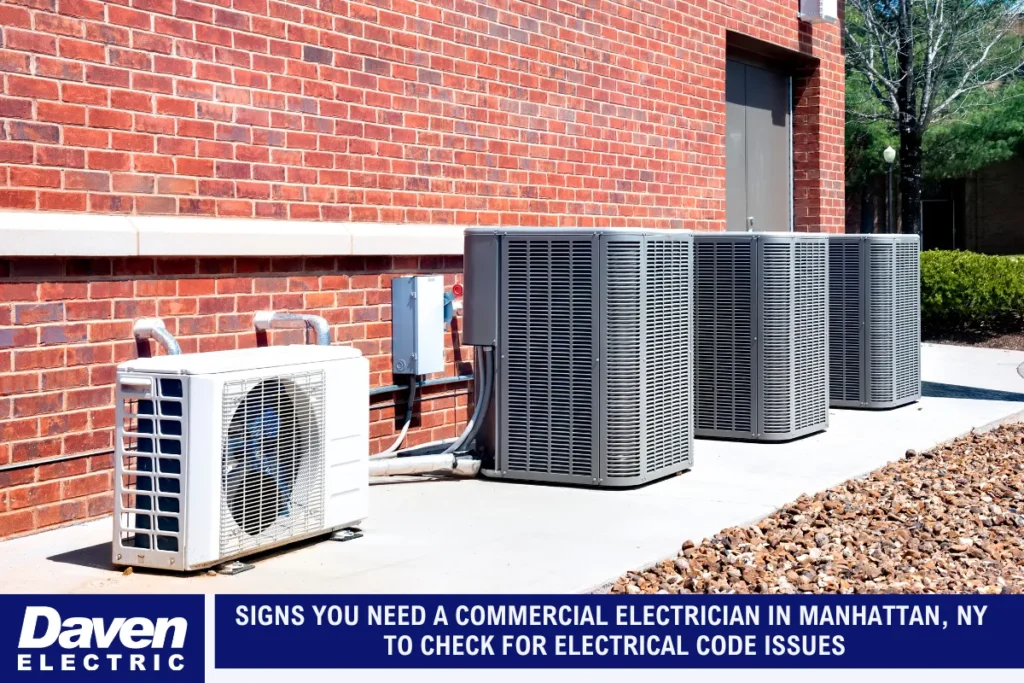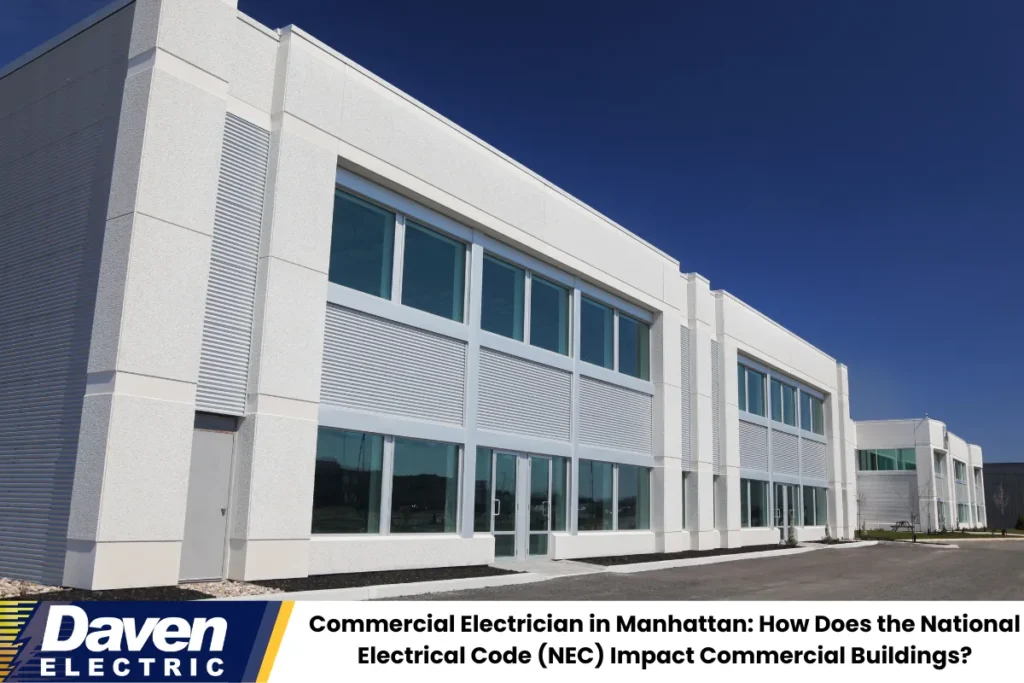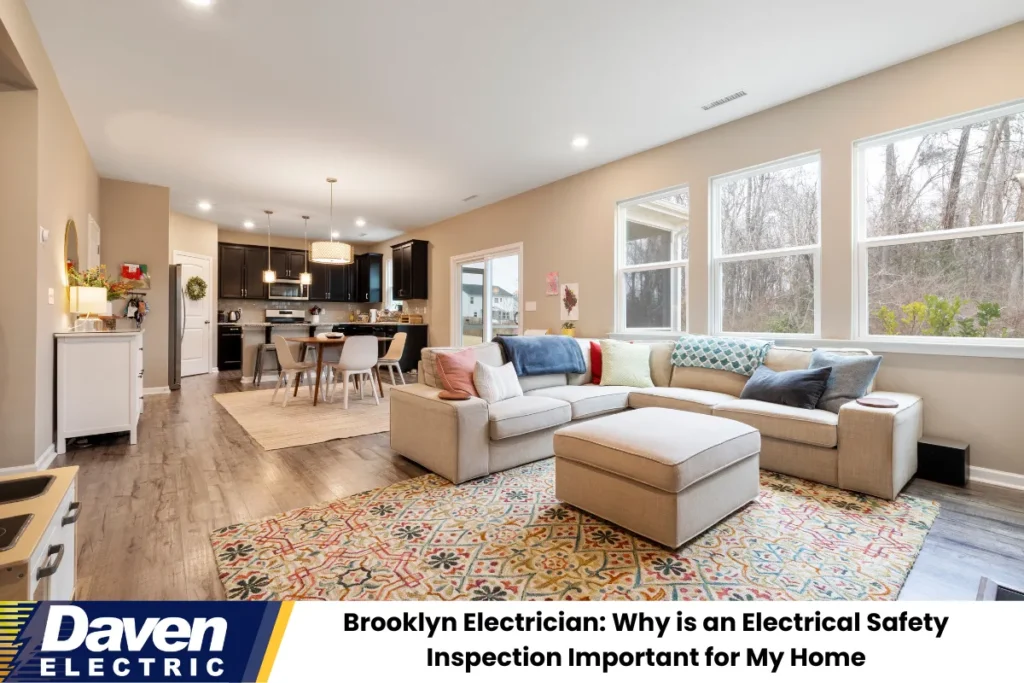In Manhattan, NY, hiring a commercial electrician isn’t just about fixing problems—it’s a critical step in keeping your building safe, functional, and up to code. With the city’s dense infrastructure and strict regulations, even small electrical issues can lead to major violations or disruptions.
This guide breaks down the most common signs that signal your electrical system may not meet current standards. You’ll learn how to spot outdated wiring, recognize overloads, and understand when professional inspection is more than just a good idea—it’s a necessity.
Flickering or Dimming Lights Are Not Just an Annoyance
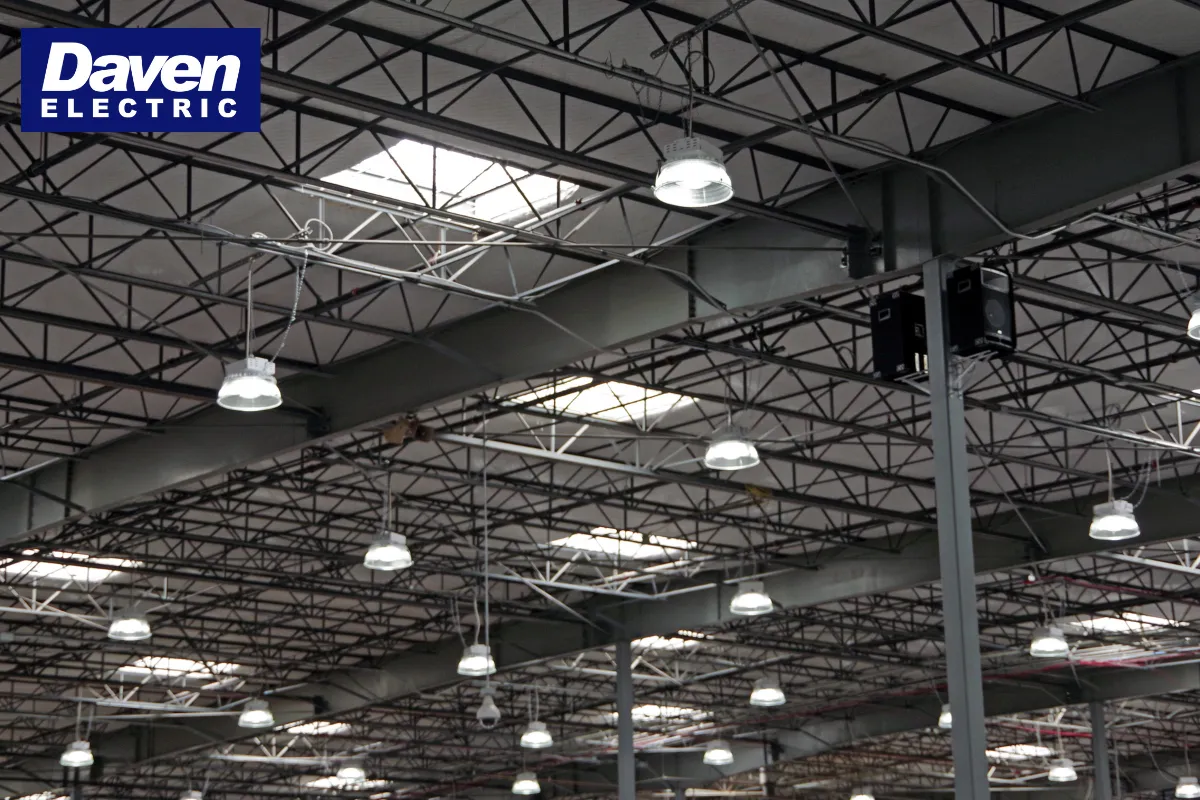
Light fixtures that flicker or dim on their own often point to deeper electrical problems. In commercial environments, this issue may affect multiple offices, floors, or work areas.
While a single flickering bulb might be harmless, widespread light inconsistencies can signal:
- Loose wiring or faulty connections
- Poor distribution of voltage
- Undersized circuits that can’t handle modern equipment
- Inadequate grounding or corroded terminals
These symptoms shouldn’t be overlooked. They’re not just about poor lighting—they’re potential safety risks and often violations of the NYC electrical code, which demands consistent voltage delivery for all lighting systems in commercial spaces.
Frequent Circuit Breaker Trips Could Indicate Overloaded Systems
Circuit breakers are designed to protect your property from electrical overloads. If they trip frequently, it’s a clear sign that something is wrong. In a commercial building, this could mean your system can’t keep up with the demand of modern electronics and machinery.
Breakers trip for several reasons:
- Excess power consumption across circuits
- Short circuits due to faulty appliances or wiring
- Ground faults from damaged insulation
- Panels not equipped to handle increased electrical loads
In Manhattan, commercial electricians are required to ensure all installations comply with current load capacity standards. Older systems, especially in pre-war buildings, are often not equipped to meet these modern needs, making inspection crucial.
Reliance on Extension Cords and Power Strips Shows Inadequate Electrical Infrastructure
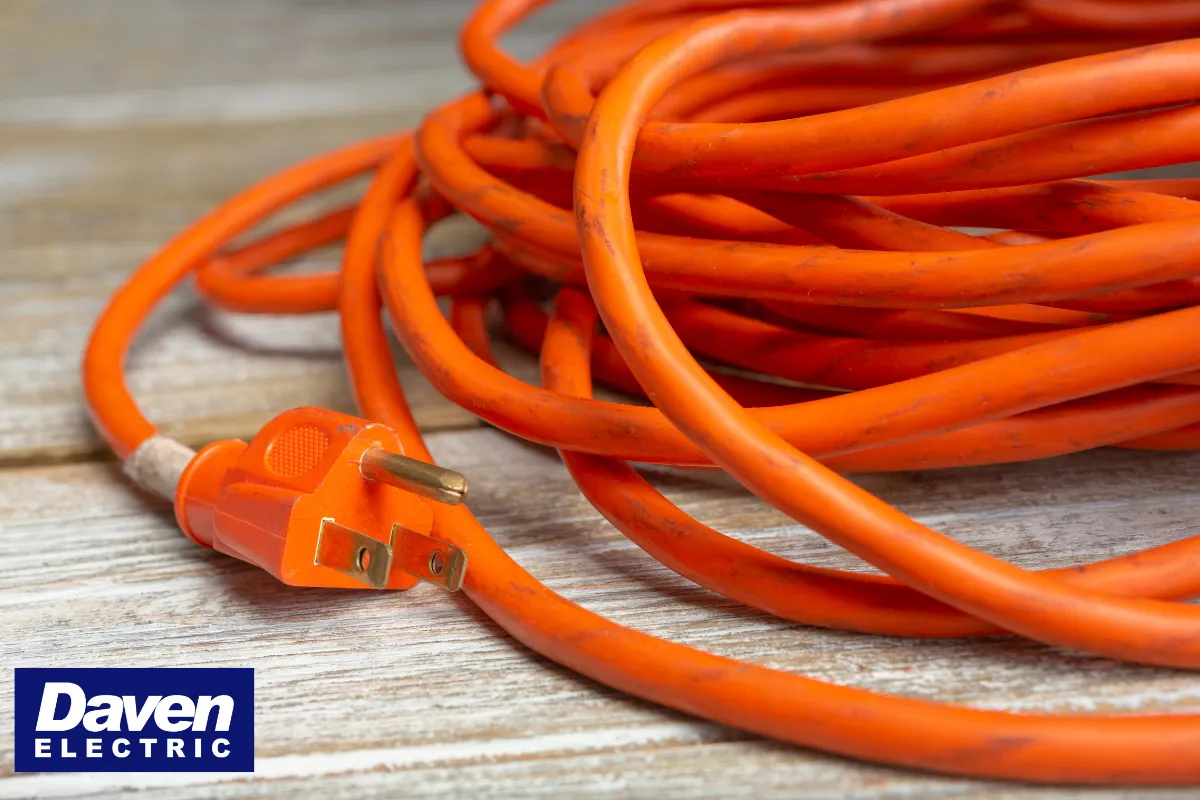
It may seem convenient to use extension cords or power strips, but relying heavily on them in a commercial setting is a red flag. This practice is not only inefficient but also unsafe. According to NYC code, temporary wiring solutions are not permitted for permanent setups.
Heavy use of cords usually means:
- Your space lacks enough outlets
- Equipment is being plugged in where circuits are already full
- You’re risking overheating and fire hazards
Extension cords are intended for temporary use, not for permanent installations. A licensed commercial electrician can assess your space and recommend proper wiring and outlet installation to ensure compliance with building standards safely.
Outlets Feel Warm or Buzz When in Use
Electrical outlets should never feel hot, make noise, or spark when a device is plugged in. If they do, something is wrong. These symptoms are early warning signs of an electrical fault that can escalate into fire risks if not addressed.
Common causes of this issue include:
- Overloaded circuits
- Loose wiring inside the outlet box
- Damaged receptacles or connectors
- Worn-out or incorrectly installed outlets
Under NYC regulations, commercial outlets must meet specific performance and safety requirements. Buzzing or hot outlets don’t just affect device performance—they compromise the safety of everyone in the building.
Lack of GFCI and AFCI Protection in Key Areas
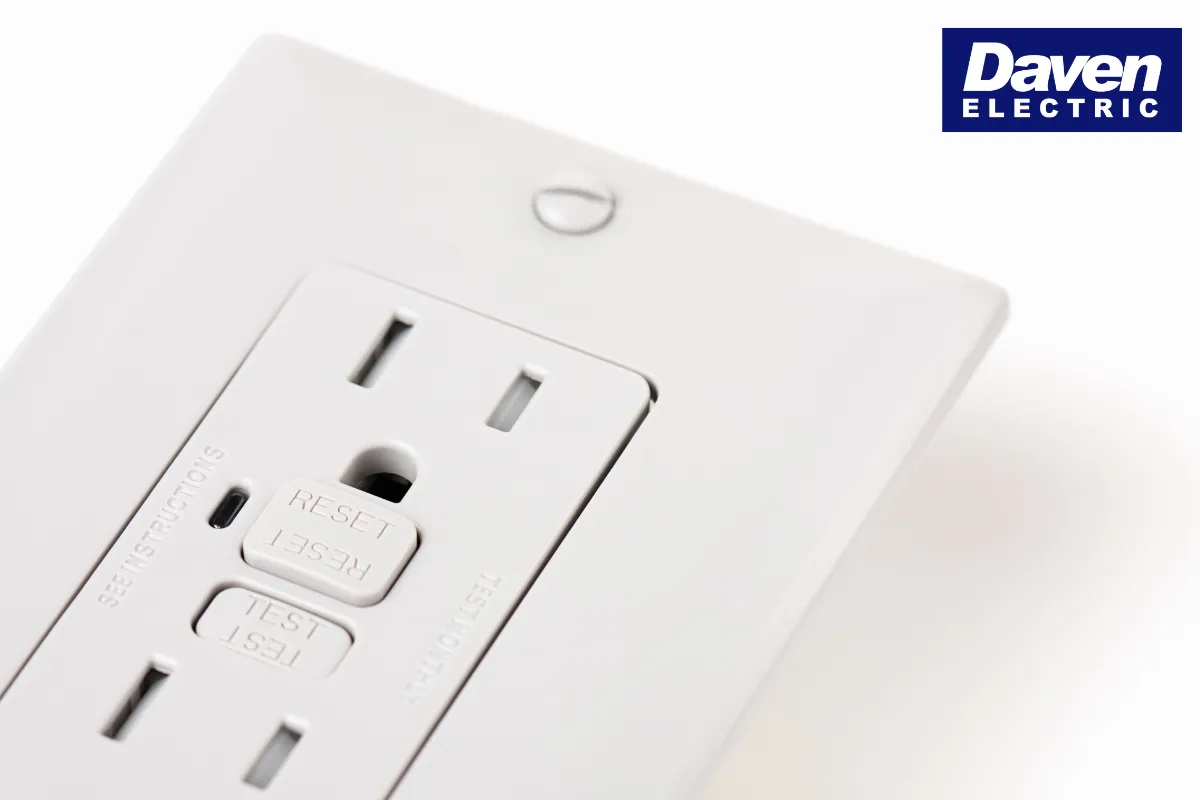
Ground Fault Circuit Interrupters (GFCIs) and Arc Fault Circuit Interrupters (AFCIs) are mandatory in many commercial areas, especially those exposed to moisture or high electrical usage. These devices prevent shocks and fires by shutting off power when irregular current flow occurs.
Buildings without GFCI/AFCI protection might be at risk and in violation of local codes, particularly in:
- Kitchens and break rooms
- Bathrooms and utility rooms
- Outdoor spaces
- Any area with sinks or running water
A commercial electrician can determine if your setup meets NYC’s requirements, which are often more stringent than the national code due to the density and age of Manhattan buildings.
Manhattan’s Unique Electrical Code Requirements
Operating in Manhattan means navigating a strict set of rules outlined in the New York City Electrical Code, which builds upon the National Electrical Code (NEC) with additional local provisions. These regulations are in place to ensure the safe installation of equipment in densely populated urban environments.
Key features of NYC’s electrical code include:
- Only licensed master electricians can perform commercial electrical work
- All electrical permits must be filed with the NYC Department of Buildings
- Installations must be regularly inspected and documented
- Specific requirements for energy efficiency and fire safety
Manhattan’s commercial spaces, especially older or multi-use buildings, often need updates to bring their systems in line with these evolving standards.
Wiring Looks Old, Frayed, or Outdated
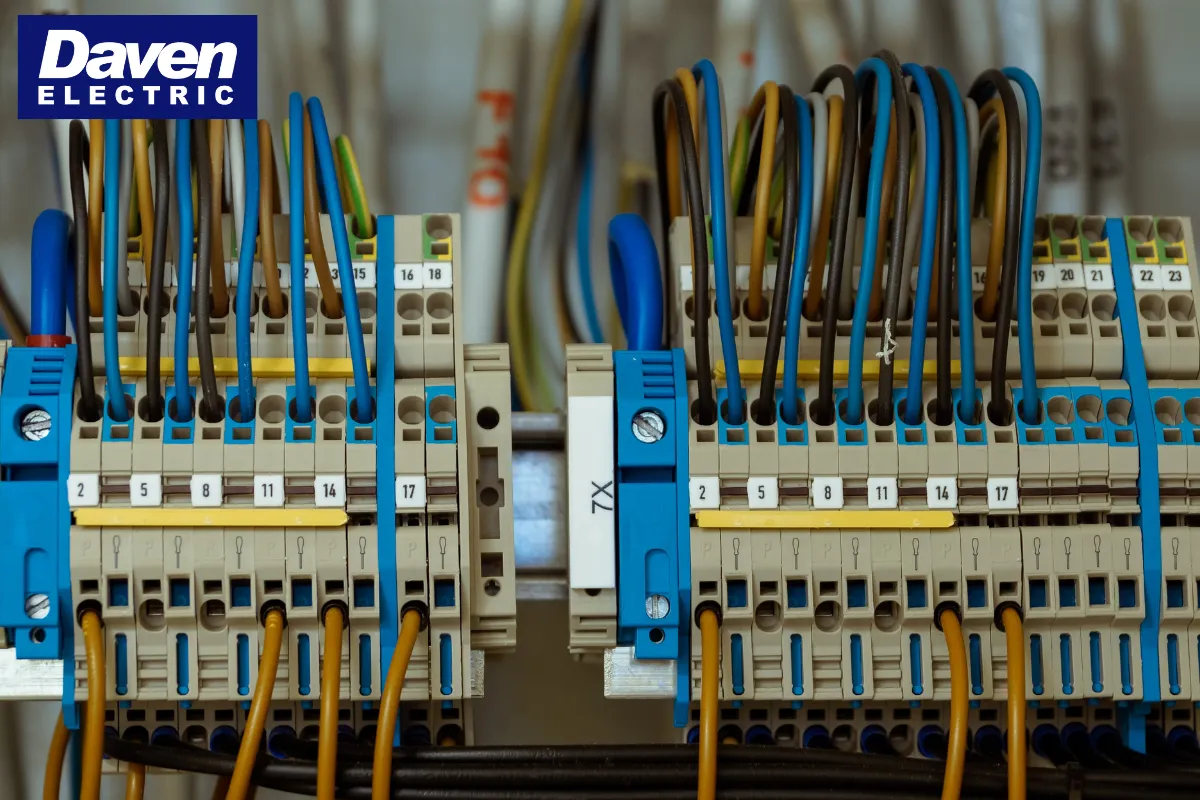
Old wiring isn’t always visible, but when it is, fraying or discoloration is a clear indication that it needs to be replaced. Many Manhattan buildings still use outdated systems such as:
- Cloth-insulated wires from pre-war periods
- Aluminum wiring from the 1960s and 1970s
- Knob-and-tube systems, common in historic structures
These wiring methods not only fail to meet modern electrical standards but are also considered fire hazards and are often uninsurable. They may not support advanced equipment, HVAC systems, or updated lighting required by commercial tenants.
Inconsistent Power or Voltage Drops Across Equipment
When equipment in your office or store doesn’t function at full capacity—or shuts down unexpectedly—it might not be the device itself. It could be voltage drops caused by uneven power distribution.
Voltage inconsistencies can lead to:
- Damaged computers, printers, and other electronics
- Reduced efficiency in machinery
- Loss of sensitive data
- Safety risks from underpowered devices
Commercial electricians can test your building’s voltage levels and ensure circuits are balanced to meet both operational and safety standards.
Renovating Without Electrical Upgrades Is a Missed Opportunity
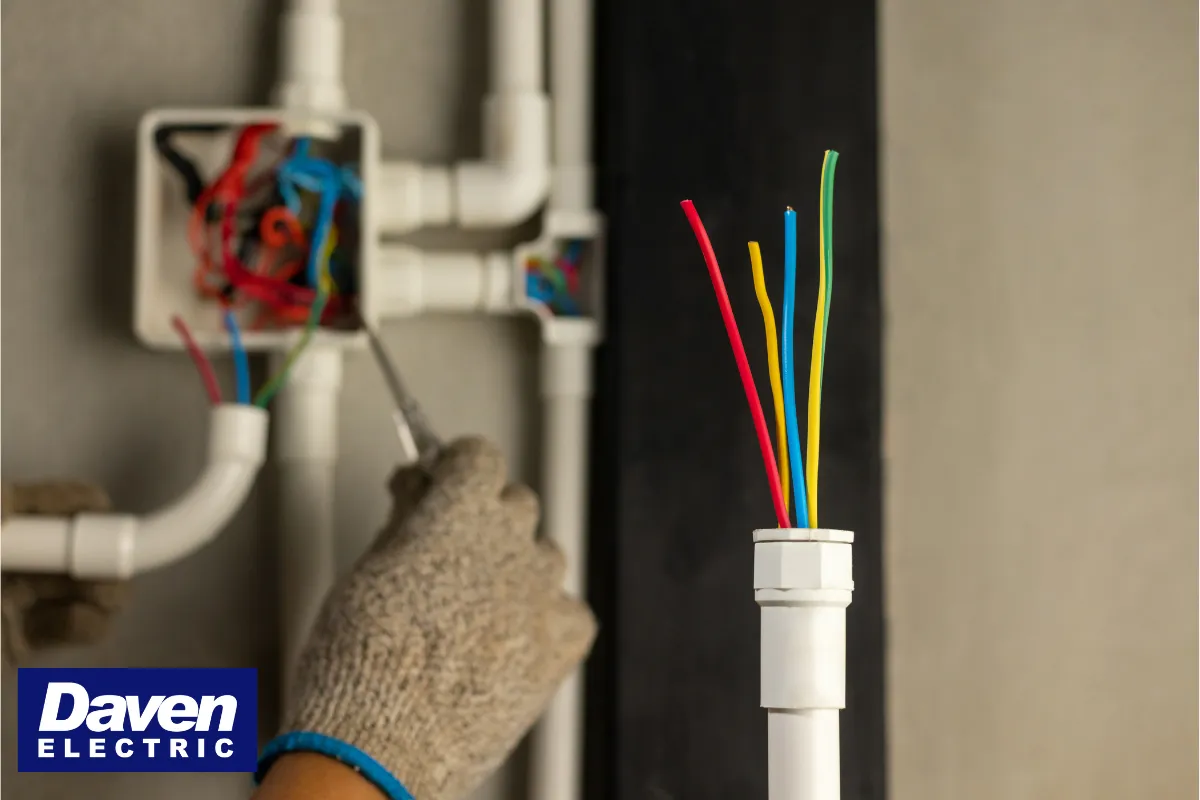
Many property owners renovate commercial spaces but skip over necessary electrical upgrades. This is a mistake that can lead to failed inspections or, worse, an emergency shutdown once the space is in use.
Renovations are the perfect time to:
- Add new outlets where needed
- Increase panel capacity
- Install smart building technology
- Replace outdated wiring and fixtures
Engaging a commercial electrician early ensures you won’t encounter costly code violations later on.
Your Last Inspection Was Years Ago—or Never
Electrical inspections aren’t just for when things go wrong. They’re a preventive measure that can uncover hidden dangers before they become disasters.
In NYC, inspections are especially important due to:
- Changing electrical codes
- Constant wear and tear on older systems
- High equipment usage in commercial spaces
If your building hasn’t been inspected in the past few years—or ever—it’s time to schedule a comprehensive evaluation. Skipping this step puts both your business and the people inside the building at risk.
A Quick Look at NYC Electrical Violation Penalties
Failing to comply with local codes can result in serious consequences for property owners and business tenants. Some common penalties include:
- Building violation fines from the NYC Department of Buildings
- Legal liabilities in the case of accidents
- Invalidation of insurance coverage
- Forced business closures until repairs are completed
Hiring a commercial electrician is more than just a safety measure—it’s a legal necessity in Manhattan.
How a Commercial Electrician Solves These Issues
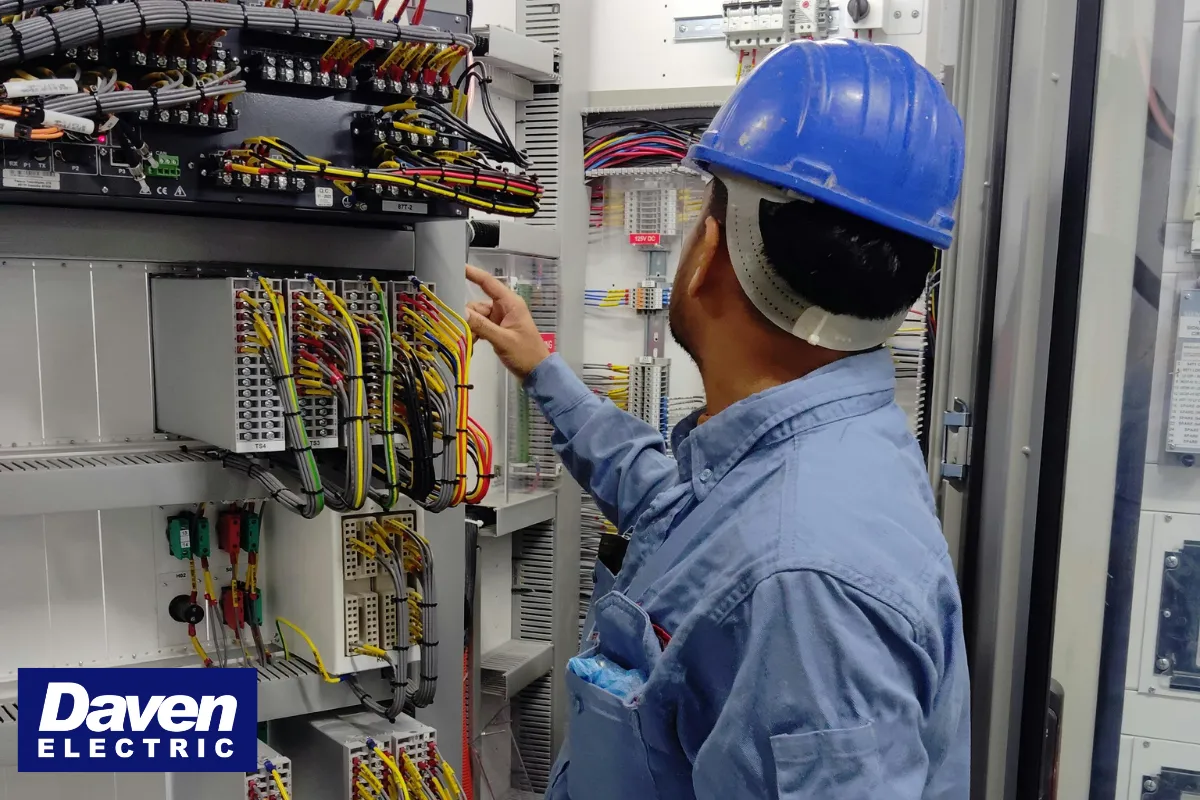
A commercial electrician brings expertise, certification, and experience tailored to NYC regulations. Their job is to assess, repair, and update electrical systems to ensure they’re safe and comply with legal regulations.
During a typical visit, they may:
- Inspect electrical panels, wiring, and circuit loads
- Identify outdated or dangerous components
- Test for grounding, voltage irregularities, and code compliance
- File required permits and schedule inspections with the city
This level of service ensures your commercial space can run efficiently without risking safety or legal problems.
Why Acting Early Is Always the Better Option
Addressing electrical issues before they escalate has major advantages:
- Avoid unexpected equipment breakdowns
- Reduce the risk of fire or injury
- Keep your business open and compliant
- Save money on emergency repairs
Manhattan’s real estate is fast-paced, and tenants expect reliable, up-to-date infrastructure. Staying ahead with professional help positions your property for long-term success.
Final Thoughts on Keeping Your Commercial Space Electrically Safe
Knowing the signs of electrical trouble and understanding NYC code is essential for anyone managing a commercial space in Manhattan. Issues like flickering lights, outdated wiring, overloaded panels, and irregular voltage aren’t just inconvenient—they’re dangerous and often illegal if left unresolved.
Hiring a licensed commercial electrician is the most effective way to safeguard your property, tenants, and investment. Regular inspections, timely upgrades, and code compliance are your best defense against future disruptions and safety hazards.
The bottom line? Electrical issues don’t fix themselves. The longer you wait, the more you risk.
Manhattan Commercial Electrician – Daven Electric Corp.
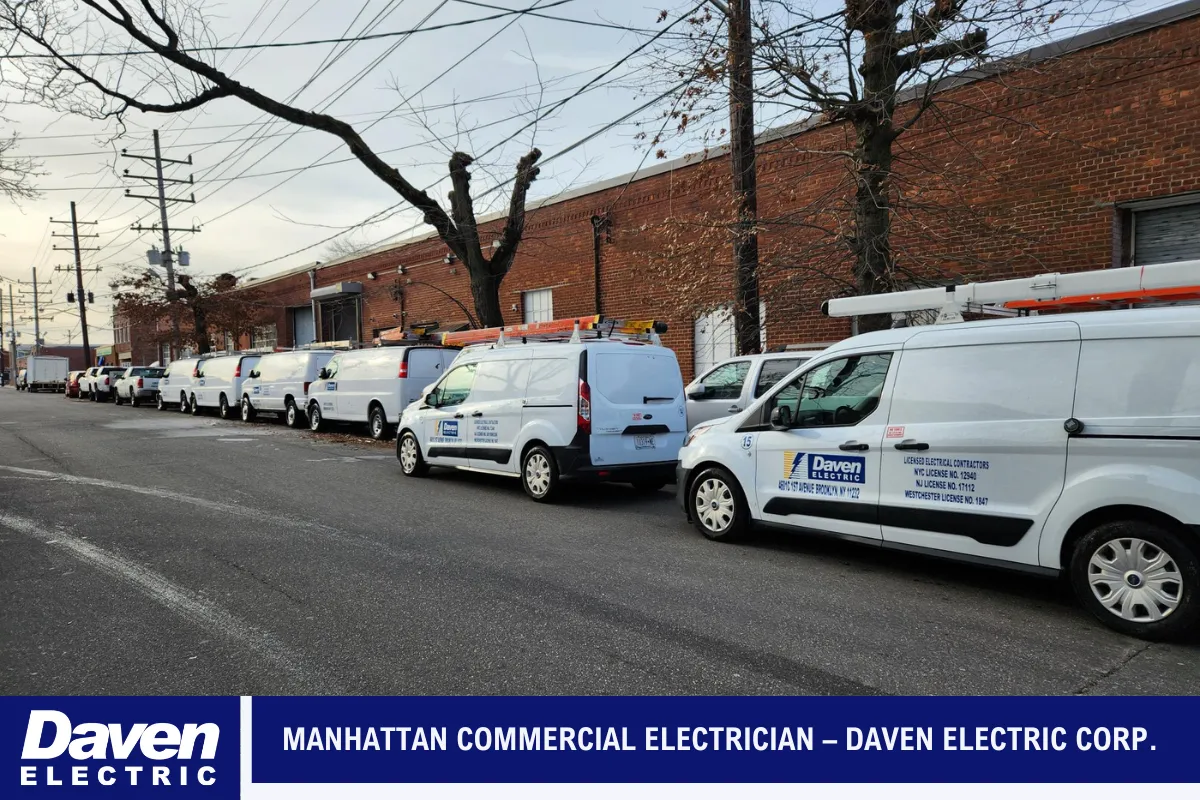
Electrical problems shouldn’t slow down your business. Whether you’re dealing with flickering lights, old wiring, overloaded panels, or anything in between, Daven Electric Corp. is ready to help! Our team of licensed electricians knows what it takes to keep Manhattan buildings safe and running smoothly.
We work with a wide range of commercial properties, including retail stores, offices, restaurants, warehouses, and more. We also service residential and multi-unit buildings. Regardless of the size or age of your property, we can inspect, repair, upgrade, or install whatever your electrical system requires.
Call us today at (212) 390-1106. Let’s get your building up to code and powered the right way!
Frequently Asked Questions (FAQ)
What are the top reasons commercial buildings in New York fail electrical inspections?
Electrical inspections are essential for property maintenance and legal compliance, especially in New York. Buildings often fail due to violations of the NYC electrical code and building code regulations.
Common reasons include:
- Outdated or damaged electrical wiring
- Overloaded circuits or poorly distributed loads
- Missing or malfunctioning GFCI outlets in wet areas
- Unsafe lighting fixtures or exposed electrical components
- Use of temporary wiring instead of permanent installations
In many cases, business owners are unaware that even minor changes, such as upgrading to energy-efficient lighting, may necessitate a building permit. Failing to meet safety standards or not hiring a licensed commercial electrician for upgrades can also lead to code violations.
To stay compliant, schedule regular electrical testing, maintain accurate records, and ensure that all upgrades are performed by certified professionals who are familiar with New York City codes.
Why is overloaded wiring a serious issue in commercial properties?
Overloaded circuits pose serious risks, particularly in commercial properties where power demand is high. Too many appliances or equipment running on a single circuit causes excessive heat buildup, which can:
- Damage the circuit breakers
- Melt or ignite electrical wiring
- Trip breakers frequently disrupt operations
- Increase the risk of electrical fires
According to NYC electrical code and general safety standards, all wiring and load distribution should be done by a qualified commercial electrician. If left unchecked, overloading can void insurance coverage and result in costly repairs or even business closure.
The best way to prevent overload is to:
- Conduct routine electrical testing
- Upgrade panels if needed
- Spread loads across multiple circuits
- Avoid excessive use of extension cords or plug-in strips
Business owners should treat circuit health as a key part of property maintenance, not just an emergency fix.
What does an electrical inspection include for a Manhattan commercial property?
In Manhattan, a comprehensive standard electrical inspection is required for commercial properties. It ensures the building meets both the NYC electrical code and the broader building code. A certified commercial electrician or inspector usually examines:
- Electrical panels, breakers, and wiring repairs
- Presence and function of GFCI outlets
- Condition and placement of lighting fixtures
- Proper grounding and bonding of systems
- Functional fire alarm systems
- Code-compliant electrical components and devices
- Energy compliance, including the use of energy-efficient lighting
They’ll also verify that any previous electrical work was permitted properly with a valid building permit.
These inspections are often required:
- Before a new tenant moves in
- After renovations or electrical upgrades
- When filing for a Certificate of Occupancy
- During routine safety assessments
Passing inspection isn’t just about safety—it’s also a key requirement for legal operation in New York commercial spaces.
How can energy-efficient lighting improve safety and reduce costs?
Energy-efficient lighting isn’t just good for your utility bill—it also improves building safety. It helps meet current electrical code and building code standards in New York.
Here’s how:
- LED fixtures run cooler, reducing the risk of overheated electrical components
- Modern lighting fixtures use less wattage, preventing overloaded circuits
- Many come with built-in sensors or dimmers for smarter energy use
- They last longer, reducing the need for frequent replacements or risky maintenance in hard-to-reach places
From a compliance perspective, many cities, including Manhattan, require or incentivize energy upgrades as part of sustainability goals. These upgrades may even impact your eligibility for building permits or future inspections.
To get the most from your upgrade:
- Consult a licensed commercial electrician
- Choose lighting solutions approved for commercial environments
- Combine upgrades with other improvements, like GFCI outlets or electrical testing
You’ll boost energy efficiency, reduce downtime, and improve workplace safety all at once.
Why is it important to work with a commercial electrician in NYC?
Hiring a licensed commercial electrician in New York isn’t optional—it’s critical. The city has some of the strictest electrical code and building code requirements in the country. Commercial electricians are trained to navigate this complex system and ensure every part of your electrical setup is legal, safe, and efficient.
They handle:
- Full electrical inspections and diagnostics
- Installation and upgrade of lighting fixtures, fire alarm systems, and electrical components
- Wiring repairs, panel upgrades, and energy audits
- Documentation for building permits
A professional also ensures that your building is protected from common issues, such as overloaded circuits or non-compliant GFCI outlets. They are familiar with local ordinances and stay informed about updates to safety standards and energy efficiency guidelines.
Working with a qualified electrician protects your investment, ensures your operations run smoothly, and helps prevent delays, fines, or shutdowns during surprise inspections.
Read more: Common Electrical Code Violations: Commercial Electricians in Manhattan Fix Every Day

